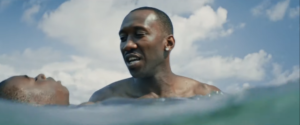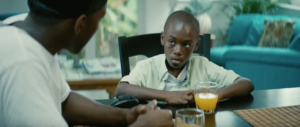Premature (2019): An intimate 'welcome to womanhood' tale
SPOILERS AHEAD. Premature is a story about the pain of love and realities. Transitioning from youth to our perspective of adulthood, how do we grapple with loss?
Incluvie Foundation Gala - Learn More


I read recently that Father’s Day didn’t become a national holiday until 1972. Mother’s Day, on the other hand, was established in 1914. Why the long gap? Much (and somewhat not) to my surprise, the pushback was against the very demographic the holiday wished to celebrate. Despite the value holidays like Father’s Day represents to many families, and consumerism, it can be a prime time to discuss what “father” and “family” mean to the general public. The term “father” itself connotes a biological connection that is rooted in concepts of bloodline, dominance, and a certain type of masculinity. In the media, we are introduced to father figures as exemplars for education and life lessons.
In my own life, my father served as this kind of influence, although he served these life lessons gently with a side of emotional intelligence. I remember a time when one of my school friends said she thought my dad looked “kinda mean.” Personally, I chalk it up to the look of a tortured artist. He isn’t Mr. Smiley by a long shot. He may look coarse, but he is an incredibly sensitive and dutiful father. But it doesn’t mean he never gets angry. Though, being the most accessible masculine figure in my life, he never bombarded me with any toxic aggression. It distinguished him from other dads and men I encountered. His was the only masculine energy in our household, yet he defied the usual masculine types, something I am proud to write here. I recall many times when my dad would say that he couldn’t relate to many cisgender men. It got me thinking, where do we go to see positive masculinity? Are these spaces readily accessible? In Moonlight (2016), father figures, and their representation, embody how positive relationships can exist within the duality of masculine and feminine traits.

The first time I really saw the depths of masculinity being explored was in Barry Jenkins’ Moonlight. Specifically, one centering on Black cisgender men. Thinking about the history around racialized masculinity, Black men are thoroughly dehumanized while white men are venerated. Birth of a Nation is an example of using Black men to propagate the notion of villainy and who needed to rise to violently subjugate them. A lot of racist or exploitative propaganda around Black men was foundational to Hollywood’s entertainment outset.
There is so much that informs us about what is unfamiliar. Some of it can be educational. Unfortunately, a lot of it can also be harmful. If we take a moment to think about the “signifier” and the “signified,” we know words, sounds, tastes have visual associations. Therefore, if we hear the word “danger” what imagery comes up in our minds? It’s subjective. However, it is no question that there has long been an echoing cautionary tale against Black bodies in our society. Anti-blackness is a global epidemic. This lends another false narrative around Black masculinity. If Blackness is altogether “undesirable,” then so are its socially and racially constructed behaviors. However, like many masculine attributes, it is not merely a racialized influence. I believe Moonlight is a story that deconstructs many misconceptions, masculinity in particular. The beauty of this is that it stays within the Black community. As viewers, we get to see the nuances of Black masculinity from Black men. But for this article, I will highlight a brief yet momentous character. A character that perhaps on the surface, (just like my dad), may look coarse and unfriendly due to his livelihood and demeanor. But, instead, we are introduced to a Black man who pushes back against the stereotypes that would otherwise leave him typecasted.
Juan, played by the great Mahershala Ali, represents something greater than Little’s caretaker. Although he wasn’t the main character, I argue that Juan’s energy really never left Little/Chiron/Black throughout the film. At the beginning of their relationship, Juan is a guardian, while Little’s mother (Naomie Harris) fails in taking care of him. Caretaking is viewed as more of a feminine role: the mother stays at home, cooks, cleans, and takes care of the children until they mature. In turn, the father goes out and works to bring home everything the mother needs to perform her duties. These familial tropes are consistently being challenged in our present society. I know Black families in particular where these traditional roles are versed. Yet, we still don’t often see a masculine figure serving as a “caretaker” in this traditional, more feminine sense in media.
Before Little really “understood” his sexuality, his body, etc., Juan was there to facilitate empathy and wisdom. Choices guide us to understand ourselves a bit more. Juan isn’t just a drug dealer, but the drug dealer that supplies Little’s mother. Yet he decides to be a positive representation for Little to lean on in life. Little from early on was bullied for being different. If the role of Juan showcased a hardass Dad type, their relationship could have been very different. Specifically, the scene where Little asks Juan what a faggot is displays Juan’s sensitivity to difference. He could have browbeaten Little to “straighten up” or even otherize him further. Instead, he was honest. He told him not to let anyone belittle him. Juan, and his partner Teresa (Janelle Monáe), encouraged Little to be patient. You ain’t gotta know right now…not yet.

Just like any paternal (or any other) relationship, complications interfere. Just as Juan is a positive light in Little’s life, he also influences a negative one. Juan, as a drug dealer, directly impacts Little’s mother, Paula, who struggles with drug addiction. This is one of the reasons why Little is so neglected. It is possible this is where Juan’s strong empathy arose. He feels partly responsible to help Little due to his own effect on Little’s circumstances. This nuance of “good or bad” is a strong theme throughout this film.
Even years later, when Juan has passed and Little becomes Black (played by Trevante Rhodes), you can see the masculine energy of Juan come through. Thus, this “good or bad” existential question comes back. Black has taken on a more “dominating” masculine figure than how we viewed him as a young boy and teenager. He becomes a successful drug dealer himself. Just like Juan, there is a duality of softness juxtaposed with toughness. This is clearly exposed through Black’s rekindling with Kevin. Black is eager to show Kevin who he has become: independent, resilient and not the bullied kid from the neighborhood. So much is left unsaid when they reconnect. But it was the same when Black was Little. There was so much tension and hurt in his silences. Then, boom, one day he had even and exploded. As it relates to gender, masculinity need not be inherently toxic as we often see it. There has been a grave distortion of its purpose. There have been silences on the topic of it, too. Femininity is not the only positive attribute we can see from our caretakers. Whether it is your father, a guardian, or whoever takes care of you, masculinity can be a part of that process.
For me, the scene in the water is the most memorable intimate scene between Little and Juan. They are not connected by blood; but in this scene especially, the water really bound them together. Thicker or not, water is much, much deeper. I often return to that swimming scene. It seems ordinary but is truly resonating. Little is learning to float. Wading in the Atlantic Ocean, the weight of the ocean around him, the pressure of the world around him. Juan, teaching him, stands with his hands holding up Little’s head, saying, I got you, I promise…you’re in the middle of the world now.
Related lists created by the same author
SPOILERS AHEAD. Premature is a story about the pain of love and realities. Transitioning from youth to our perspective of adulthood, how do we grapple with loss?
Related diversity category
Trigger Warning with Killer Mike, a part of Netflix's Black Lives Matter Collection, features different social experiments showcasing the larger state of race relations in our society.
Related movie/TV/List/Topic
Death on the Nile (1978) film mindless entertainment playing out on sets and wonders larger than the stakes, both of these films fail to live up to the hype of Agatha Christie's mystery. Check out cast & characterless controversy.